2013年春人教版英语八年级下册 Unit 4 He said I was hard-working教案
2013年春人教版英语八年级下册Unit 4 He said I was hard-working.课件 Section B 2

(have a big fight)
_______________________________ She had a big fight with her husband _______________________________ last weekend.
5. 多数人认为现在的年轻人有必要经
Math
Spanish
hard-working
good at speaking
History
Science
can do better
lazy student
Dear aunt _____, I got my report card today. My math teacher said that I was hard-working. My Spanish teacher said I was good at speaking. My history is not so good. The teacher said I could do better. My science teacher said I was a lazy student. I’ll have to try harder at science. Yours, Scott
9. She said I was lazy, which isn’t true.
true既可作形容词, 意为“真实的、真正
的”, 又可作副词, 意为“真实地、准确
地”。
e.g. The news is true.
这条消息是真的。 He is a true gentleman. 他是一个正人君子。 She speaks true. 她实话实说。
envelope from school? He always gets nervous.
八年级英语下册 Unit 4 He said I was hardworking Se
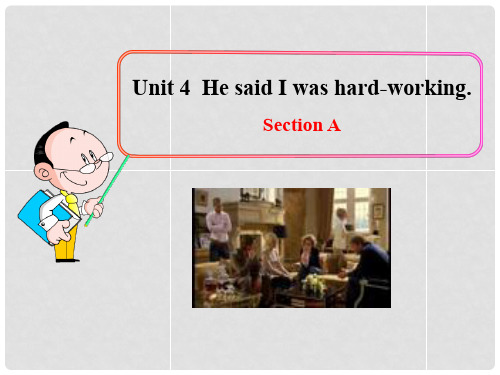
4. Marcia called everyone and told them she wasn’t going to have the party.
true false 5. Lana told Marcia she would bring some books to her house on Friday night.
Unit 4 He said I was hard-working.
Section A
Lead in
• What are some soap operas you know?
• What are some things that happen on soap operas ?
Presentation
2. Marcia said _L__a_n_a_t_h_o_u_g_h_t__sh_e__w_a_s__ __co_m__i_n_g_t_o_h__er__h_o_u_s_e_t_o_s_t_u_d_y_____.
3. Lana said__s_h_e_w__a_s_m__a_d_a_t__M__a_rc_i_a_. 4. Lana said__s_h_e_w__a_s_n_’t__g_o_in_g__to__M__a_r_c_ia_’_s__
3a Read the newspaper story. Fill in the blanks.
“Young Lives” this week
It was an exciting week for the people on the soap
opera “Young Lives”. First of all, Marcia told Ben she
___h_o_u_s_e_o_n__F_r_id_a_y__n_i_g_h_t .
人教版八年级英语下册《Unit 4 He said I was hard-working.(通用)》教案_0

Unit 4 She said helping others changed her life.一、教材分析1. 教学目标1)掌握本单元的知识点即理解并学会直接引语和间接引语的结构及用法。
2)通过学习拓展阅读,培养学生乐于助人、乐于奉献的精神。
2.重点难点教学重点:直接引语和间接引语之间时态和人称的转换教学难点:1)总结段落大意,并能概括文章的主要内容2)对志愿者活动组织的了解和讨论。
3.教学策略1) 开放式教学策略:以课堂为载体,引导学生慢慢进入广阔的知识天地。
2) 任务型活动策略:在做中学,在做中练,并在做中逐渐巩固,提高能力。
4.学习策略1)自主学习指导学生在不同要求下热情参与课堂各项活动,学习阅读技巧,运用自主学习法对课文进行快速阅读和深层阅读,达到从整体上理解课文。
2)合作学习注意学习方法,学会提问和倾听他人意见,相互交流、互帮互助,学习他人长处,合作完成任务,培养团队精神。
5.教学手段1)任务型教学途径。
2)多媒体辅助教学、视频、图片的利用,引起学生共鸣,激发兴趣。
3)为学生创设情景,注重生生互动,把时间大多让给学生,给学生自由发挥的空间。
6.教学过程新课导入歌曲导入:Listening to a song, let the world be full of love.自学指导学生通过第一次阅读课文思考1. Do you often help others? Yes,I do / No,I don’t2. Who do you often help? I often help…3. How do you help them? I help them…4. Who do you think need help?5. What can we do for them?教学步骤教学步骤Step1 Warming Up歌曲导入:Listening to a song, let the world be full of love. 设计意图:通过学生们听比较熟悉的歌曲,为学生创造相对轻松的学习气氛,引出今天所学的内容,帮助别人,让世界充满爱,一个志愿者教师——杨蕾的故事。
八年级英语下册:Unit 4 He said I was hard-working知识点复习(人教新

Unit 4 He said I was hard-working.一. 教学内容:Unit 4 He said I was hard-working.二. 教学目标:学习如何转述别人所叙述的内容。
三. 教学过程:1. 重点词及短语。
1. 直接引语和间接引语。
(一)重点词汇:1. ever: adv. 曾经,永远(1)Do you ever watch soap opera?(2)I hardlyever(几乎不曾)go to the concert.(3)True love should last forever. (永远)2. mad: adj. 疯狂的,狂热的(1)be mad at/ with sb. 生……的气(同义词组be angry with sb. )(2)be mad for sth. 因……事而生气ex: He is mad _________ his son _________ telling a lie.3. not … any more 不再……(1)He didn’t live here any more. 他不再住这里了。
(2)She wasn’t mad at me anymore. 她不再生我的气了。
4. first of all 首先5. message: n. 消息,信息(1)为某人捎个口信:①take a message _________sb.②give sb. a message(2)给某人留个口信:_________ a message _________sb.(3)传信给某人:_________ _________ a message to sb.ex: ①He left a _________ saying he would e back in a week.A. informationB. messageC. newsD. word②Can I _________ a message for you?A. bringB. leaveC. takeD. pass6. pass on 传递,继续前进①学生们在传球。
人教版新目标英语八年级下册《Unit 4 He said I was hard-working.Se

整理课件
Only listen to the tape . Then read 3a aloud. Underline importances and difficulties.
(划出重难点) Then discuss in groups
整理课件
1.身体健康 be in good health/healthy 2.感到紧张 get nervous
整理课件
Careful reading
1.Read 3a again . plete the following chart
and questions.
整理课件
(1) What’s wrong with his grandpa?
had a cold
(2)What exam did he finish last week? the end-of-year exam
saw my___D__ .
A. credit card B.ID card C. birthday card D. report
card
整理课件
lucky
幸运的
in good health 身体健康
report card 成绩单
整理课件
整理课件
1.Guess“what did they talk about?
They talked about_th__e_ir_r_e_p_o_r_t_c_a_r_d_s___ 2.Practice like them in pairs.
A. Healthy B. health C .balance D. place
3.When Bill got home, he said to his mom he _B____very
2013新版新目标英语八年级(下) Unit 4 He said I was hard-working.

Unit 4 He said I was hard-working.主备:李云彩(黄鱼圈中学)校对:一、教材分析本单元通过转述别人的话学习直接引语和间接引语,并通过―看肥皂剧转述剧中人的话和向家长转述老师对自己的评价‖这些练习活动,来理解和掌握直接引语和间接引语之间的转换规律。
培养学生学会利用精读和泛读,并能根据上下文推测生词的阅读策略。
提高学生灵活理解和运用词汇的能力,激发和培养学生热爱学习和乐于助人的品质。
二、目标引导(一)重点词汇message, village, area, meter, decision, husband, start, influence, hometown, danger, suppose, copy, ate, return, nervous, true, lucky, own, poor, thin.(二)重点短语1.have a surprise party 举办一个惊喜的聚2.be/get mad at/with sb. 生某人的气3.not…any more 不再4.bring sth. to sw. / sb. 把某物带到某地/某人5.direct speech 直接引语6.reported speech 间接引语7.first of all 首先8.call sb. 给某人打电话9.do a homework projectwork on a homework project 做家庭作业10.at one’s house doing a homework project在……家做作业11.pass sth. to sb.pass sb. sth. 把……传递给……12.pass on… 传递pass sth. on to sb. 把……传递给……13.be supposed to do sth. 被期望或被要求…14.do better in…在……方面做得更好15.be in good health 身体健康16.finish my end – of – year exams 结束年终考试17.report card 成绩单18.get nervous 变得紧张19.in the mail 在邮件中20.have a really hard time with science 自然课学得很吃力21.be surprised to do sth. 做……感到很吃惊22.help sb. do / with sth. 帮助某人做某事23.have a big fight 打了一大架24.talk to sb. 跟某人说话25.have a fight 打架26.start a bad habit 养成/开始坏习惯27.I’m sure that… 我确信……28.get over 克服29.in a poor mountain village 在一个贫穷的山村30.sound like fun to sb. 对你来说听起来是件趣事may not sound like fun to sb. 或许不是你的兴趣所在31.on a one – year program 在为期一年的援助计划中32.the Ministry Education 教育部33.Chinese Y oung Pioneers 中国少年先锋队34.sea level 海平面35.agree with sb. 同意……的观点36.open up one’s eyes 打开……的眼界/ 拓展学生的视野37.make sb. do sth. 使得某人做某事38.care for 照料、照顾39.doctors without borders 没有国界的医生40.wild animals in danger 处于危险中的野生动物(三)重点句型1.She said she was mad at Marcia.2.She said she was having a surprise party for Lana on Friday night.3.He told me he would call me tomorrow.4.She said she could speak three languages.5.It all started when she asked me if she could copy my homework.6.I asked her why she wanted to do that.(四)语法:现在完成进行时直接引语和间接引语(Direct speech and reported speech)(五)话题学会转述别人的话三、重难点解读1.She said she was having a surprise party for Lana on Friday night.她说她准备在周五的晚上为拉娜举办一个惊喜聚会。
新课标人教版初中英语八年级下册《Unit4 He said I was hardworking》教案

新课标人教版初中英语八年级下册《Unit4 He said I washard-working》精品教案单元分析:(一)、教材内容分析本单元的中心话题是:Report someone said. 围绕这一话题,主要涉及句型:—What did your math teacher say?—He said I was hard-working.—What did she say?—She said she could speak three languages.本单元的语法项目是宾语从句,直接引语和间接引语,要注意在间接引语中,人称和时态的变化。
(二)、教学重点和难点1、教学重点A、能够正确转述他人话语,会报告自己和他人的成绩单。
B、掌握直接引语和间接引语的意义、功能和用法。
C、进一步熟练一般过去时和过去进行时。
2、教学难点直接引语和间接引语的相互转换。
(三)、教学目标1、语言知识目标立足语言实践活动,在完成任务的过程中掌握动词短语,核心词汇,直接引语和间接引语。
2、文化意识目标通过本单元的学习,让学生知道如何用英语正确转述他人话语。
3、语言技能目标1)能捕捉特定的信息,抓住关键词。
2)具备较熟练的运用英语转述他人话语的能力。
3)增强学生运用英语获取更多语言信息的能力并进行阅读策略的培养。
4、学习策略目标学生能在一定程度上形成自主学习、有效交际、用英语思维和收集信息的能力,使学生在做中学英语。
5、情感态度目标A、客观、合理的评价自己和他人。
B、能主动帮助有困难的人,有助人为乐的高尚情怀。
教学过程设计Period 1.(1a—2c)Step 1. Warming upRead the chant.I am a girl, I am a girl.She said she was a girl.I can sing, I can sing.He said he could sing.I will be a doctor, I will be a doctor.He said he would be a doctor.Step 2. Lead- inT: What will you be in the future?问到第3、4个学生的时候,再问全班,What did he/she say? He/She said he/she was a/an…引出本课的重点句型。
八年级英语下册《Unit 4 He said I was hard-working》 人教新目标版
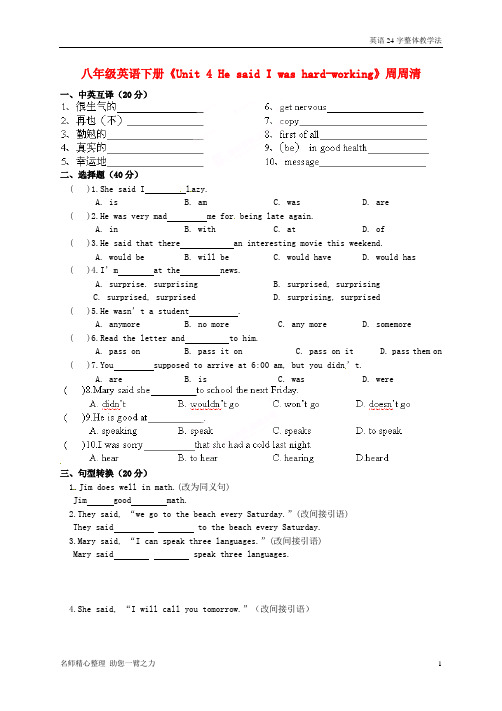
八年级英语下册《Unit 4 He said I was hard-working》周周清一、中英互译(20分)二、选择题(40分)( )1.She said I l azy.A. isB. amC. wasD. are( )2.He was very mad me for being late again.A. inB. withC. atD. of( )3.He said that there an interesting movie this weekend.A. would beB. will beC. would haveD. would has( )4.I’m at the news.A. surprise. surprisingB. surprised, surprisingC. surprised, surprisedD. surprising, surprised( )5.He wasn’t a student .A. anymoreB. no moreC. any moreD. somemore( )6.Read the letter and to him.A. pass onB. pass it onC. pass on itD. pass them on( )7.You supposed to arrive at 6:00 am, but you didn’t.A. areB. isC. wasD. were三、句型转换(20分)1.Jim does well in math.(改为同义句)Jim good math.2.They said, “we go to the beach every Saturday.”(改间接引语)They said to the beach every Saturday.3.Mary said, “I can speak three languages.”(改间接引语)Mary said speak three languages.4.She said, “I will call you tomorrow.”(改间接引语)She said call me the next day.5.The teacher said we were having an English test.(对划线部分提问)the teacher say?四、根据文章,完成下列选择题(20分)。
新课标人教版八年级英语下册Unit 4 He said I was hard-working(1)

Unit 4 He said I was hard-working(1)Ⅰ.Teaching Aims and Demands1.Knowledge Objects(1)Key vocabularygrandma;grandpa;in good health;report card;nervous;disappointing;lucky;luckily (2)Target language—How was your report?—Well,my math teacher said that I was hard-working.—Really?You’re lucky.My math teacher said I was lazy.(3)Reading practice(4)Writing practicePairwork2.Ability ObjectsTo train students’ ability of reading and writing.To train students’ ability of munication.3.Sensibility and ValueTo help students know the importance of cooperation.To raise students’ interest of learning.Ⅱ.Teaching Key PointsKey vocabulary.Target language.Reading practice.Ⅲ.Teaching DifficultiesWriting practice.Oral practice.Ⅳ.Teaching MethodsReading and writing methods.Oral practice methods.municative approach.Ⅴ.Teaching AidsThe multi-media.OHP.A projector.Ⅵ.Teaching ProceduresStep ⅠGreet the class as usual and check the homework.Get students to go on with their soap opera reports.Step ⅡShow the new words on the screen.Learn the new words.Step Ⅲ3aActivity 3a provides reading practice using the target language.Read the instructions.Ask students to read the letter on their own.When reading,ask students to point out the words and the sentences they don’t understand.Explain them to students or ask other students to help explain these items if they can.Then ask students to read the letter again and find out Judy’s report card in Activity 2b.Then check the answer with the whole class.AnswerJudy’s report is number 1.Step Ⅳ 3bThis activity provides writing practice using the target language.Show report card 3 in Activity 2b on the screen.Name:__________Class:__________Math—hard-workingSpanish—good at speakingHistory—can do betterScience—lazy studentTell students this is Scott’s report e the information on the report card to write the letter.After students finish writing,ask a student to read his or her pleted letter to the class.Step Ⅴ3cThis activity provides writing practice using the target language.First ask students to write their own report card.Tell students they can have fun and need not to tell the truth.Have students use the ments in Activities 2b and 3a for ideas.Then write the letter to a relative or a friend about their report cards.Let students plete the activitiy on their own.Step Ⅵ 4Activity 4 lets students practice their writing,speaking and listening skills.T:First I’ll ask two students to read the sample dialogue.Who would like to read?You two,please.S a:How was your report?S b:Well,my math teacher said that I was hard-working.S a:Really?You’re lucky.My math teacher said I was lazy.T:Thank you.Now make up your teacher’s ments.You don’t have to tell the truth.You can have fun.Students work in pairs,making up their dialogue.Then ask students to write what their teachers would say.Then students take turns interviewing each other about the report card.At the end have a few students share their conversations with the class.Ask students to vote on the best conversation.Give them little presents to praise them.Step Ⅶ SummaryThis class we’ve had a lot of listening,speaking,reading and writing practice.I hope you are hard-working and get an excellent report card from your teachers.Step Ⅷ HomeworkWrite down your report card down in your exercise books.Step Ⅸ Blackboard DesignUnit 4 He said I was hard-working. words and sentencesstudents don’t understand。
新课标人教版八年级英语下册Unit 4 He said I was hard-working直接与间
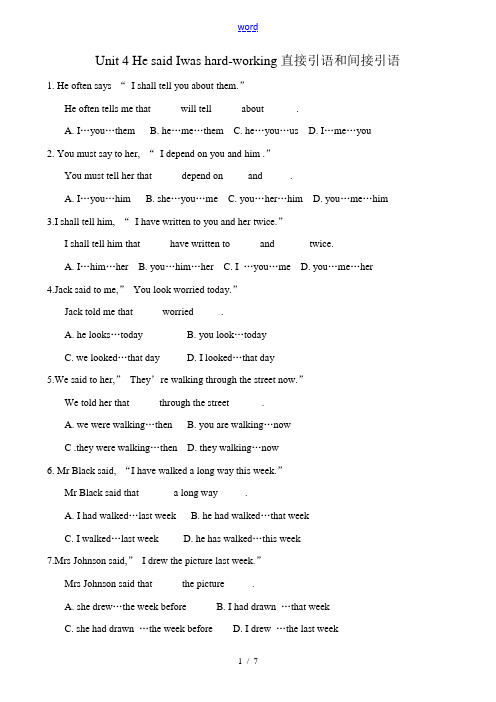
Unit 4 He said Iwas hard-working直接引语和间接引语1. He often says “I shall tell you about them.”He often tells me that _____ will tell _____ about ______.A. I…you…themB. he…me…themC. he…you…usD. I…me…you2. You must say to her, “I depend on you and him .”You must tell her that _____ depend on ____ and _____.A. I...you...him B. she...you...me C. you...her...him D. you...me (i)3.I shall tell him, “I have written to you and her twice.”I shall tell him that _____ have written to _____ and ______ twice.A. I…him…herB. you…him…herC. I …you…meD. you…me…her4.Jack said to me,”You look worried today.”Jack told me that _____ worried _____.A. he looks…todayB. you look…todayC. we looked…that dayD. I looked…that day5.We said to her,”They’re walking through the street now.”We told her that _____ through the street ______.A. we were walking…thenB. you are walking…nowC .they were walking…then D. they walking…now6. Mr Black said, “I have walked a long way this week.”Mr Black said that ______ a long way _____.A. I had walked…last weekB. he had walked…that weekC. I walked…last weekD. he has walked…this week7.Mrs Johnson said,”I drew the picture last week.”Mrs Johnson said that _____ the picture _____.A. she drew…the week beforeB. I had drawn …that weekC. she had drawn …the week beforeD. I drew …the last week8.You said to me,”I had thought it over before you asked.”You told me that you ______it over before _____.A. had thought…I askedB. had thought…you had askedC. had had thought…I askedD. thought…you had asked9.The man thought,”I shall take it back tomorrow.”The man thought that ____ take it back _____.A. I shall…tomorrowB. I shall…the next dayC. he should…tomorrowD. he would …the next day10.They said to us, “Are you afraid to leave this house ?”They asked us ____ afraid to leave _____ house.A. that were we…thisB. that we were…thatC. if were we …thisD. if we were…that11. “Do you know English ?”he asked.He asked if _______English.A. I knewB. you knowC. he knewD. I know12.He said, “Do I have anything to do with her ?”He asked ____ anything to do with _____>A. if did he have …meB. if he had…meC. whether he had…herD. whether he had…her13.I said to Jenny, “Are you getting on well with him now ?”I asked Jenny _____ getting on well with him ____.A. whether was she …thenB. if she was …thenC. how was I …nowD. how I was …now14.The teacher asked, “Has she read enough this week ?”The teacher asked ____ read enough ____ week.A. if she had…thatB. whether she has …thisC. if had she…thatD. whether has she …this15. Jane said, “What did he hear about a week ago ?”Jane asked ____ about _____.A. that he heard…a week agoB. if he heard…the week agoC. what he had herd…a week agoD. what he had heard…the week before16. People said, “Who had they taken away when it got dark?”People asked who______ taken away when it _____dark.A. had they …gotB. they had…gotC. had they had…had gotD. they had had…had got17. She asked,”Whose house will he break into next time ?”She asked whose house ____ break into _____.A. will he…next timeB. would he…the next timeC. he will…next timeD. he would…the next time18. Jack said to her ,”Where do you spend your holidays ?”Jack asked her where ____ holidays.A. she spend herB. you spend yourC. she spent herD. you spent your19.Black asked me, “Why haven’t you left here yet ?”Black asked me why ____ yet.A. I hadn’t left thereB. I haven’t left hereC. hadn’t I left thereD. haven’t I left here20.The teacher asked her, “|Does the sun rise in the east ?”The teacher asked her ____ the sun ____ in the east.A. if…riseB. if…risesC. whether…roseD. whether did …rise21.The man said to me, “Please send for a doctor now !”The man ____ me _____ for a doctor.A. ordered…to send…thenB. told …send…nowC. asked…to send…thenD. asked…send…now22.The mother said, “Be friendly to others , son.”The mother ______ friendly to others.A. asked her son beB. ordered her son to beC. told her son beD. told her son to be23.I said to my daughter, “Don’t make any mistakes in it .”I _____ my daughter +_____ any mistakes in it.A. asked…don’t makeB. ordered…didn’t makeC. told…not to makeD. told…to not make24.He said, “Mr Black , introduce yourself to them, please.”He ______ Mr Black ____ to them.A. asked…to introduce yourselfB. asked…to introduce himselfC. told…introduce yourselfD. ordered…introduce himself25.The teacher said to the boys,“Pay attention to this.”The teacher _____ the boys _____ attention to ______.A. asked…pay…thisB. ordered…to pay…thisC. told…pay…thatD. told…to pay…that26. The man shouted,“You don’t make so much noise.”The man ____ too much noise.A. ordered them not to makeB. told you not to makeC. asked them to not makeD. shouted you to not make27.The captain said,”Take hold of this end, man !”The captain ____ the soldier ____ hold of +_____ end.A. asked…to take…thatB. asked…take…thisC. ordered…to take…thatD. ordered…take…this28. The mother said,”Doctor, please save my son.”The mother _____ son.A. asked doctor save myB. asked the doctor to save herC. told doctor save myD. told the doctor to save her29.He said to the soldiers,”Put down your guns at once.”He _____ the soldiers ____ down ____ guns at once.A. ordered…to put…theirB. told…to put…theirC. ordered…put…yourD. told…put…your30. She said that she ____ there for a long time.A. has livedB. had livedC. livedD. was living31. Tom told me that he _____.A. will help me with my geographyB. will help me for my geographyC. would help me with my geographyD. would help me for my geography32. She told me that her mother ____ for several days.A. has been illB. had been illC. is illD. was ill33. Please tell me ____ these books you like best.A. whatB. what ofC. whichD. which of34. He asked me _____ my home was.A. whatB. whereC. whichD. when35. “_____?”she asked her son.A. Where you have beenB. Where you wentC. Where had you beenD. Where have you been36. The boy said,”I don’t like dancing.”The boy said ____ like dancing.A. I don’tB. he doesn’tC. I didn’tD. that he didn’t37. She said to me, “I’m living in a small village now “A. She said to me she is living in a small village nowB. She said to me that I am living in a small village nowC. She told me that she was living in a small village thenD. She told me that she lived in a small village then.38. The children said,”We had a football match today.”The children said____ a football match _____.A. they had…todayB. they had had…that dayC. we had…todayD. we had had…that day39. The students said,”We have finished cleaning our classroom.”The students said _____ cleaning _____ classroom.A. they had finished…theirB. they finished…theirC. they have finished…theirD. we had finished…our40 “If you aren’t here on time tomorrow.”Mr Black said to Jenny, “ I’ll write your parents about this.”Mr Black told Jenny that _______.A. he will write to her parents about this if she isn’t here on time tomorrow.B. he would write to her parents about this if she wasn’t her on time the next day.C. he would write to her parents about that if she wasn’t there on time the next day.D. he was going to write to her parents about that if she wasn’t there on time the next day.41.The boy often says, “I’m going to be a player when I grow up.”The boy often says ____ be a player when _____.A. he was going to…he grew upB. he is going to…he grows upC. he would…he grew upD. I was going to…I grew up42. The teacher said to us, “Light travels much faster than sound.”The teacher said to us that light ____ much faster than sound.A. will travelB. traveledC. travelsD. was traveling43. “My brother joined the army in 1978.”Said Wei Fang.Wei Fang said that her brother ____ the army in 1978.A. joinedB. had joinedC. would joinD. joins44.My friend said,“You needn’t go”A. My friend said that I needn’t goB. My friend told me not to goC. My friend told you not to goD. My friend said that I didn’t have to go45. “Are you going to your home town this summer ?”he said.A. He told me that I was going to my home town this summer.B. He said that if I was going to my home town that summer.C. He asked me whether was I going to his home town this summerD. He asked me if I was going to my home town that summer.46. “Would you like coffee or tea ?”asked Mother.Mother asked us ______.A. if I would like coffee and teaB. if would I like coffee or teaC. whether I would like coffee or teaD. whether would I like coffer or tea47.He didn’t tell me _____ or go home.A. whether to waitB. if to waitC. to waitD. if that she shout to wait48 “Why didn’t you call me an hour ago ?”he said.A. He asked me why I didn’t call him an hour agoB. He said why I hadn’t called him an hour beforeC. He asked why hadn’t I called him an hour before ?D. He asked why I hadn’t called him an hour before49. Mother asked,“What has happened to you, Xiao Li ?”A. Mother asked, Xiao Li, what has happened to youB. Mother asked what had happened to Xiao LiC. Mother asked Xiao Li what had happened to himD. Mother asked Xiao Li what ha happened to you50. He said to his son “Put on more clothes.”A. He told his son to put on more clothesB. He asked his son put on more clothesC. He said to his son that he would put on more clothesD. He told his son that he should put on more clothes。
八年级英语下册《Unit 4 he said i was hard Period 1》教案 人教新目标版
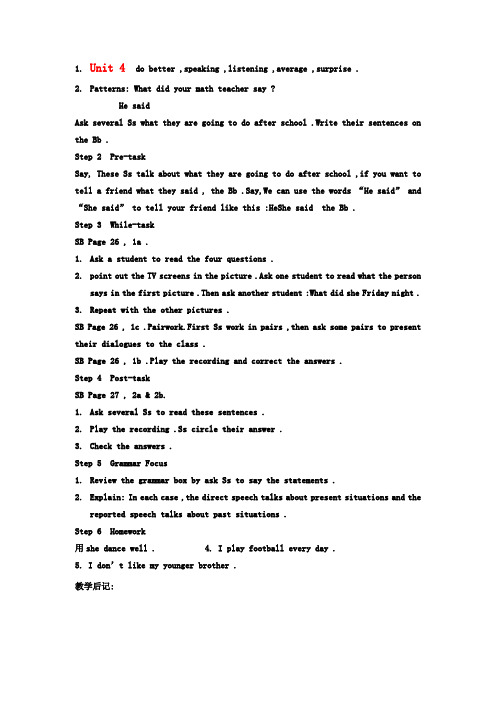
1.Unit 4 do better ,speaking ,listening ,average ,surprise .2.Patterns: What did your math teacher say ?He saidAsk several Ss what they are going to do after school .Write their sentences on the Bb .Step 2 Pre-taskSay, These Ss talk about what they are going to do after school ,if you want to tell a friend what they said , the Bb .Say,We can use the words “He said” and “She said” to tell your friend like this :HeShe said the Bb .Step 3 While-taskSB Page 26 , 1a .1.Ask a student to read the four questions .2.point out the TV screens in the picture .Ask one student to read what the personsays in the first picture .Then ask another student :What did she Friday night .3.Repeat with the other pictures .SB Page 26 , 1c .Pairwork.First Ss work in pairs ,then ask some pairs to present their dialogues to the class .SB Page 26 , 1b .Play the recording and correct the answers .Step 4 Post-taskSB Page 27 , 2a & 2b.1.Ask several Ss to read these sentences .2.Play the recording .Ss circle their answer .3.Check the answers .Step 5 Grammar Focus1.Review the grammar box by ask Ss to say the statements .2.Explain: In each case ,the direct speech talks about present situations and thereported speech talks about past situations .Step 6 Homework用she dance well . 4. I play football every day .5. I don’t like my younger brother .教学后记:。
新课标人教版八年级英语下册Unit 4 He said I was hard-working 知识探

Unit 4 He said I was hard-working知识探讨本单元我们学习的是间接引语,当我们引述别人的话时,用自己的话把意思转述出来,这种转述别人话的部分就叫做间接引语。
For example:1.“I am not mad at Marcia anymore,” said Lana.Lana said she was not mad at Marcia anymore.2.“I will call you tomorrow,”he told me.He told me he would call me the next day.3.“Why do you want to copy my homework?” I asked her.I asked her why she wanted to copy my homework.2.注意要点:1.不用逗号、冒号、引号。
2.考虑到人称和时态的变化。
[典型例题解析] 规律总结1.Tina is a good student.She (学得好)all subjects.解析:do well in 意思是“在某些方面做得好”,本句主语Tina 是第三人称单数,所以谓语动词用does。
答案:does well in/is good at 如果do well in 后面是动词时,动词该用什么形式呢?2.My mother told me she (have)more leisure time the next year.解析:短语the next year(下一年)提示我们应用过去将来时would+动词原形。
答案:would have 当主句是一般过去时时,宾语从句中该用什么时态?X例经典1.“The moon moves round the earth,” our teacher said.(转换为间接引语)Our teacher said the moon________ round the earth.解析:在此句中,“The moon moves round the earth”是个真理,所以时态不变。
八年级英语下册Unit_4_He_said_I_was_hard-working全单元人教新目标版P
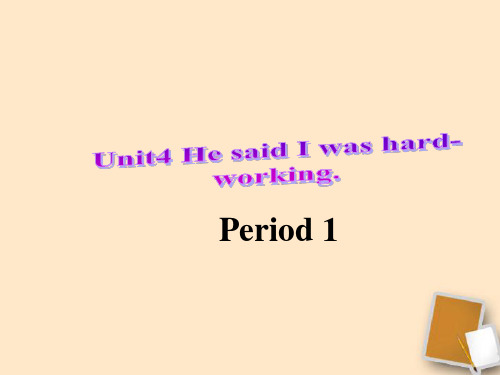
Marcia
Lana thinks she’s coming to my house to study.
A: What did Marcia say? B: She said Lana thought she was coming
to her house to study.
Lana
She said she was mad at Marcia. be mad at sb. 对某人生气 be mad with sth. 对某事生气
I’m not going to
Lana
her house on
Friday night.
She saidshe was not going to her house
on Fridayses:
1.Tom says, “ I am late for class.”
game show 游戏节目
sports show 体育节目
talk show 访谈节目
sitcom 情景喜剧
soap opera 肥皂剧,连续剧
1a 肥皂剧(soap opera)是指以家庭问题为题 材的电视连续剧,这种电视剧主要以家庭 妇女为主要观众,以家庭日用品商家为赞 助商,以普通家庭生活环境为舞台.
3. Judy said (goes\went) to the movies last Friday.
4. She said she (will\would) bring snacks and pizza to your party.
5. My mother said she (is\was)cooking supper.
computer. 他说这是他的电脑。
I don’t like
- 1、下载文档前请自行甄别文档内容的完整性,平台不提供额外的编辑、内容补充、找答案等附加服务。
- 2、"仅部分预览"的文档,不可在线预览部分如存在完整性等问题,可反馈申请退款(可完整预览的文档不适用该条件!)。
- 3、如文档侵犯您的权益,请联系客服反馈,我们会尽快为您处理(人工客服工作时间:9:00-18:30)。
Unit 4 He said I was hard-working. I.Teaching objectives 单元教学目标II. Teaching materials analyzing and rearranging 教材分析和教材重组1. 教材分析本单元的话题是“Telling a story”,通过单元学习,要求学生掌握如何用reported speech来描述别人说过的话,并能进行特殊疑问句和一般疑问句的提问和回答。
通过学习report card,进而能用自己的话语来进行自我评价。
在此基础上,学生能对自己的各个方面有一个全面的认识。
有关Alan’s letter则是本单元目标语言的综合运用和体现,学生在读懂该短文的基础上进行模仿写作训练,汇报自己的学习情况以及老师对自己的评价。
掌握并能运用一些评价的短语,在总结、归纳的基础上复习旧词汇,学习新词汇。
Self check要求学生从词汇知识和语言应用能力两方面进行自我评价,检验对本单元目标语言的掌握程度;要求学生阅读一篇文章并且把它改写成对话的形式,这是对学生语言应用能力的综合评价。
Reading是一篇有关青年志愿者无私服务的文章,也是对本单元所学的目标句型的综合运用;让学生在阅读的基础上巩固所学句型,并从情感教育的方向进行渗透,从而最终完成本单元的教学任务并且贯穿进去德育目标。
Section A 第一部分围绕soap opera 这一话题展开讨论(1a)、听力(1b)、会话(1c)训练,让学生通过肥皂剧认识本单元的目标语言,即Reported what someone said的句型;第二部分继续围绕soap opera的话题展开听力(2a-2b)、会话(2c)训练,帮助学生进一步掌握direct speech 和reported speech的用法;第三部分继续围绕本单元的功能句型reported speech开展各种课堂活动,活动形式为补全短文所缺单词(3a)并且续写新闻报道(3b);4是一个小组活动,要求学生以角色扮演的形式完成一组对话训练并且在每组中分别扮演不同的角色,主要训练学生运用语言交际的能力。
Section B 1a呈现了一些描述学生学习状况和表现的功能句子,要求学生判断哪些描述符合自己的情况;1b要求学生结对谈论他们在1a中的回答,是对功能句子的口头练习;2a、2b和2c是有关report card的听力和口语练习,也是对本单元目标语言的拓展训练;3a是一篇Alan写给奶奶的一封关于他的学习成绩的信,要求学生根据材料内容判断29页2b中的哪个成绩卡是Alan的,并要求学生仿照该信用目标语言进行应用写作训练(3b-3c);4要求学生运用所掌握的reported speech 完成report card并根据回答结对进行会话练习。
Self check 1要求学生用给出的单词填空并能用这些单词造句,强化学生对重点词汇的理解与掌握;2要求学生阅读一篇文章并且把它改写成对话的形式,也就是把间接引语转换成直接引语,是对学生语言应用能力的检验。
Reading 以一篇有关青年志愿者的阅读文章为中心,设计了5个Section:Section 1是阅读的热身,要求学生讨论哪些人需要帮助及如何帮助他们,从而引入阅读的主题——一个志愿者的故事;Section 2呈现了阅读文章以及阅读策略,阅读策略帮助学生学习如何根据上下文了解生词的意思,从而克服阅读障碍;Section 3是对阅读效果的检验及语言知识的学习,形式为填表、回答问题和概括大意;Section 4列出了一些世界各地的志愿组织,要求学生讨论他们希望加入哪个组织并给出理由。
该活动将帮助学生了解一些志愿组织的工作,激发他们乐于助人、关爱他人、关心社会的良好道德风尚。
2.教材重组和课时分配Period 1 (Section A: 1a, 1b, 1c, 2a, 2b, 2c) FunctionPeriod 2 (Section A: 3a, 3b, 4)Reading and writingPeriod 3 (Section B: 1a, 1b, 2a, 2b, 2c)Integrating skillsPeriod 4 (Section B: 3a, 3b, 3c, 4)Reading and writingPeriod 5 (Self check)Self checkPeriod 6 (Reading: Section 1-Section 5)Extensive readingIII. Teaching plans for each period分课时教案Period 1 FunctionTarget language 目标语言1. Words and expressions重点词汇和短语soap opera, ever, mad, anymore2. Key sentences重点句子What did Marcia say?She said she was having a surprise party for Lana on Friday night.Ability goals 能力目标Enable students to report what some said.Learning ability goals 学能目标Help students learn how to report what some said with reported speech.Teaching important and difficult points 教学重难点How to report what someone said.Teaching aids 教具准备A tape recorder and some pictures.Teaching procedures and ways 教学过程与方式Step I Lead-inT: Hello, everyone! I know many of you like doing sports after school. Right? What other things do you like to do in your free time? Now I will ask some of you.Then ask some of the students and write their sentences on the blackboard.T: These students talk about what they are going to do after school, if you want to tell a friend what they said, how would you tell him?Write the words “He said” and “She said” on the blackboard.T: We can use the words “He said” and “She said” to tell your friend like this: He/She said he/she was going to play basketball after school.Get the students to repeat.Ask four students to stand in front of the class, and the teacher asks them the following questions as a reporter.1. What are you going to do when you grow up?2. What are you going to do next week?3. What are you going to do after school?The students will give different answers, then ask a top student to report what they said. “I am going to be a doctor.”—What did she say?—She said she was going to be a doctor.“I am going to have a party on Friday night.”—What did he say?—He said he was going to have a party on Friday night.“I am going to do my homework.”—What did she say?—She said she was going to do her homework.“I am going home after school.”—What did she say?—She said she was going home after school.Step II Function presentation (1a, P26)T: Do you know what a soap opera is?Explain what soap opera is, what things happen on soap operas. Then let them name some soap operas they know.Soap opera: a television or radio story about the daily lives and relationships of the same group of people, which is broadcast regularlyList of some soap operas: 《东北一家人》《我爱我家》《编辑部的故事》《成长的烦恼》《闲人马大姐》…Then ask about their opinions on soap operas.T: Do you like watching soap operas? Why or why not?S: Yes. They are full of fun. They make you laugh and relaxed.S: No. They are too long and boring....Ask the students to look at the pictures, point at the TV screens in the picture.T: Look at the picture. Two girls are watching a soap opera. They are talking about it. Ask one girl: “Please read what Marcia said.”S: She said she was having a surprise party for Lana on Friday night.Repeat the other pictures in the same way.T: So when we report what someone said, we should use reported speech. Today, we will learn about it.Step III Listening and speaking (1b, 1c, P26)In this step, students will do some listening and oral practice about the reported speech in activity 1a.First, play the tape and let students listen and number the statements in the picture. Then play the tape again and let them repeat the sentences with reported speech.Repeat: She said she was having a surprise party for Lana on Friday night.She said Lana thought she was coming to her house to study.She said she was mad at Marcia.She said she wasn’t going to Marcia’s house on Friday night.T: Who said the first two sentences?S: Marcia.T: And who said the last two sentences?S: Lana.T: Good. Now let’s do a pairwork. Use the question on the blackboard and the sentences you repeated to make conversations.Write “What did Marcia/Lana say?” on the blackboard.First Ss work in pairs, then ask some pairs to present their dialogues to the class. Sample structure: What did Marcia/Lana say?She said ...T: Very good. Can y ou report what I said? First, He said to Tom, “We have made a mistake.”S: He said to Tom that they had made a mistake.T: Very good. Next, they said, “We are going to see Lily now.”S: They said they were going to see Lily then.T: He said to me, “which do you like better, this or that?”S: He asked me which one I liked better.Step IV Listening (2a, 2b, P27)This step provides listening practice with the target language. Students will learn more about the use of tense in direct speech and indirect speech.First, point to the five sentences in 2a and ask different students to read them to the class.T: You will hear a conversation between two people who are talking about a soap opera on TV. Circle true or false after each statement according to what you hear.Play the recording. For the first time, Ss just listen for main idea.Play it again, Ss circle their answers.Then check the answers.Then play the tape again, and let students circle the correct answers in 2b. They should pay attention to the use of tense. Then let them compare the use of tense in direct speech and reported speech.T: Now, work in pairs, one reads the sentences in the pictures and the other reads the sentences below the pictures. (after reading) The sentences in the pictures are called “direct speech”, and those below the pictures are called “reported speech”. What tenses are used in each speech? Have you noticed the difference?Ss: The direct speech uses present tense, and the reported speech uses past tense.T: Good point. This is very important. You should remember it. Let’s do some oral practice.Step V Pairwork (2c, P27)In this step, students will do some oral practice with the target language.T: Look at the sample conversation in 2c. I’d like two of you to read it. V olunteers? Ask two students to read the conversation. Then let students make conversations according to what they hear in the listening material.T: Now I will play the tape recording again. Listen and make some notes. You will use the notes to make conversations. Are you ready?Play the recording again. Give students several minutes to prepare.Check the students’ work by asking several pairs to present their conversations to the class.A sample conversation:A: What happened on “Young Lives” last night?B: Ben told Lana that Marcia was going to have a surprise party for her.A: Then what did Lana say?B: She said she would go to Marcia’s house on Friday night.A: Then what?B: Marcia called everyone and told her that she could bring some drinks and snacks toher house on Friday night.B: What did Marcia say?A: She told Lana she would be glad.Step VI Grammar focusReview the grammar box. Give students a summary of the grammar point.T: You can answer the question What did he/she say? In two ways:1) by repeating the words spoken (direct speech)2) by reporting the words spoken (indirect or reported speech).Show the following explanations on the screen.Direct speech repeats, or quotes, the exact words spoken. When we use direct speech in writing, we place the words spoken between inverted commas (“....”) and there is no change in these words.Examples:She says “What time will you be home?”She said “What time will you be home?”and I said “I don’t know!”John said, “There’s an elephant outside the window.”Reported speech is usually used to talk about the past, so we normally change the tense of the words spoken. We use reporting verbs like say, tell, ask, and we may use the word that to introduce the reported words. Inverted commas are not used.Examples:She said, “I saw him.” → She said that she had seen him.That may be omitted:She told him that she was happy.She told him she was happy.Say and tell:Use “say”when there is no indirect object:He said that he was tired.Always use tell when you say who was being spoken to (i.e. with an indirect object): He told me that he was tired.T: Now look at the grammar box. Study the change of tense between direct speech and indirect speech. Then finish the chart on the Bb.Let students finish the following chart.Then let students do some practice with the change of tense.Substitution drill:Instruction: This semester, a new student comes to your class. He introduces himself to the class. You and your partner are talking about what he said.1. “I am 14 years old.”A: What did he say?B: He said he was 14 years old.2. “I come from Australia.”A: What did he say?B: He said he came from Australia.3. “I will work hard at school.”A: What did he say?B: He said he would work hard at school.4. “I can play Guitar.”A: What did he say?B: He said he could play Guitar.5. “I can speak good Chinese”A: What did he say?B: He said he could speak good Chinese.6. “Everyone is so friendly here.”A: What did he say?B: He said that everyone was so friendly here.7. “I live with my parents in an apartment.”A: What did he say?B: He said that he lived with his parents in an apartment.8. “I think we will be good friends.”A: What did he say?B: He said that we would be good friends.Step VII Homework1. 用She/He said 将直接引语改为间接引语。
